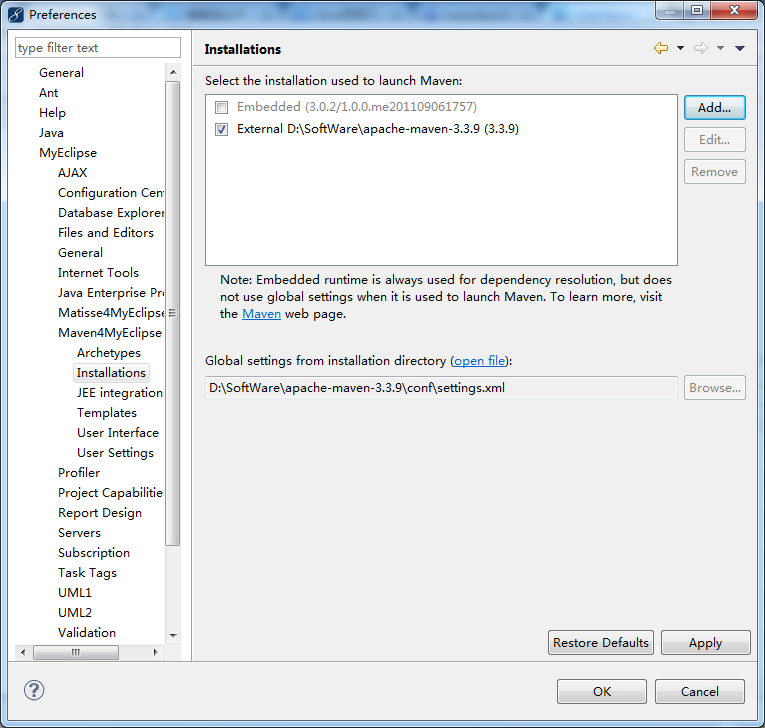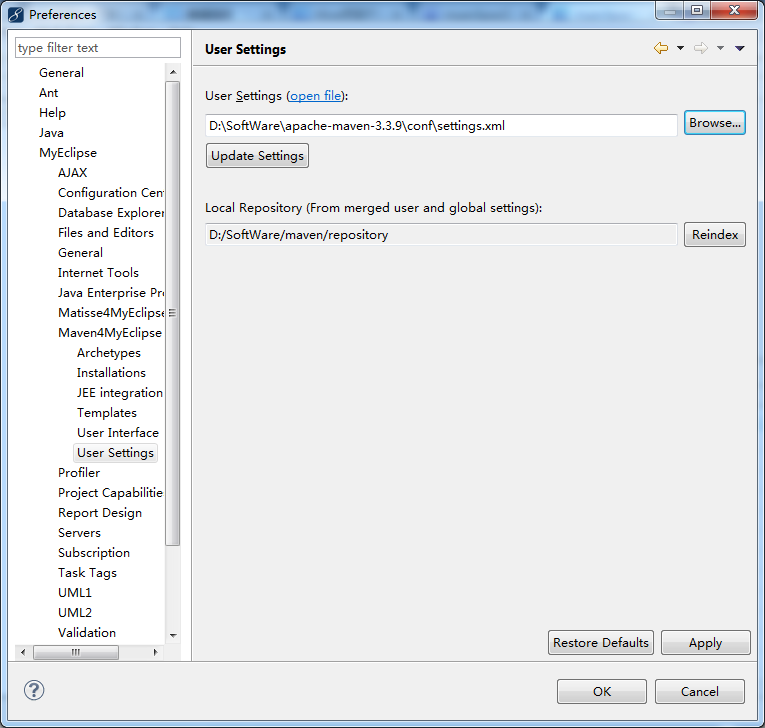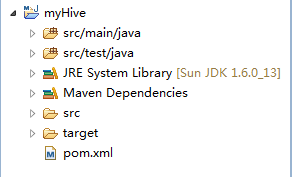写在前面的话
可详细参考,一定得去看
HBase 开发环境搭建(EclipseMyEclipse + Maven)
Zookeeper项目开发环境搭建(EclipseMyEclipse + Maven)
我这里,相信,能看此博客的朋友,想必是有一定基础的了。我前期写了大量的基础性博文。可以去补下基础。
步骤一:File -> New -> Project -> Maven Project
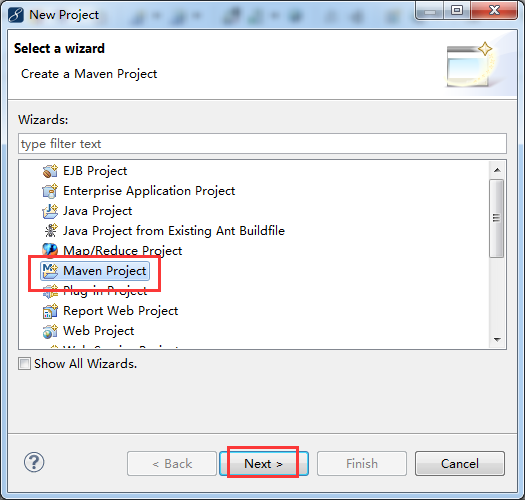
步骤二:自行设置,待会创建的myHBase工程,放在哪个目录下。
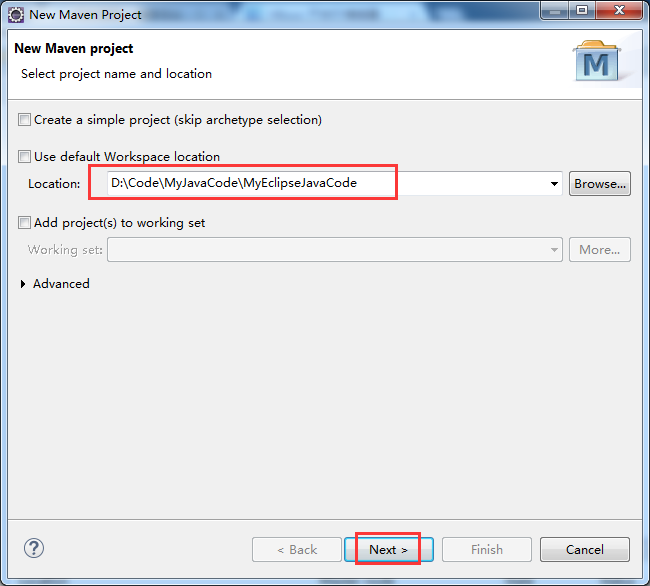
步骤三:
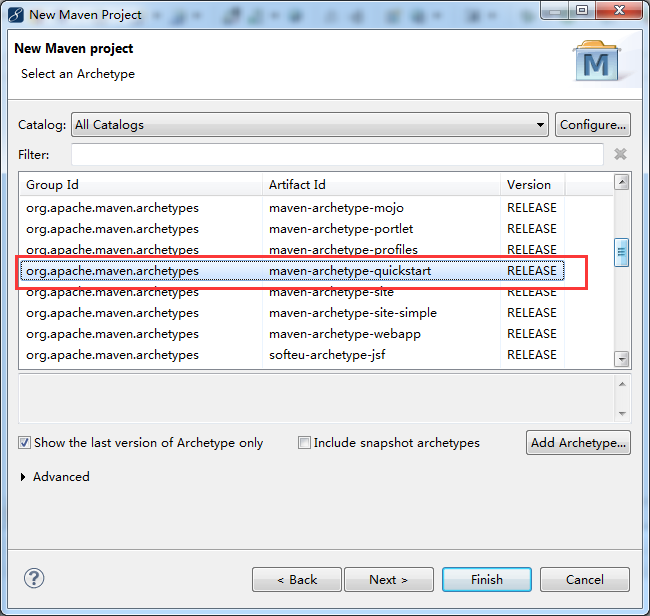
步骤四:自行设置
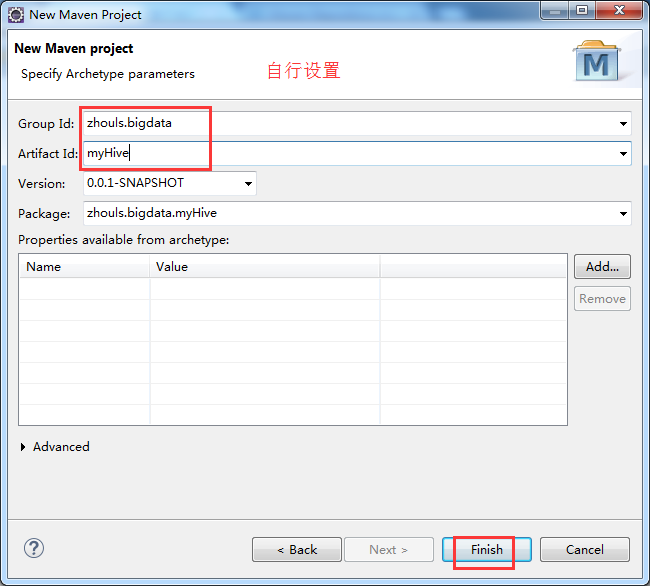
步骤五:修改jdk
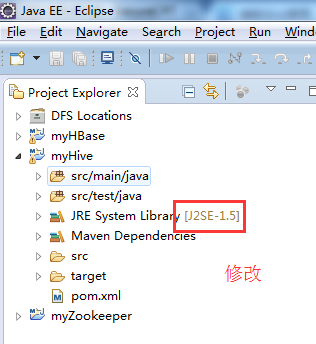
省略,很简单!
步骤六:修改pom.xml配置文件
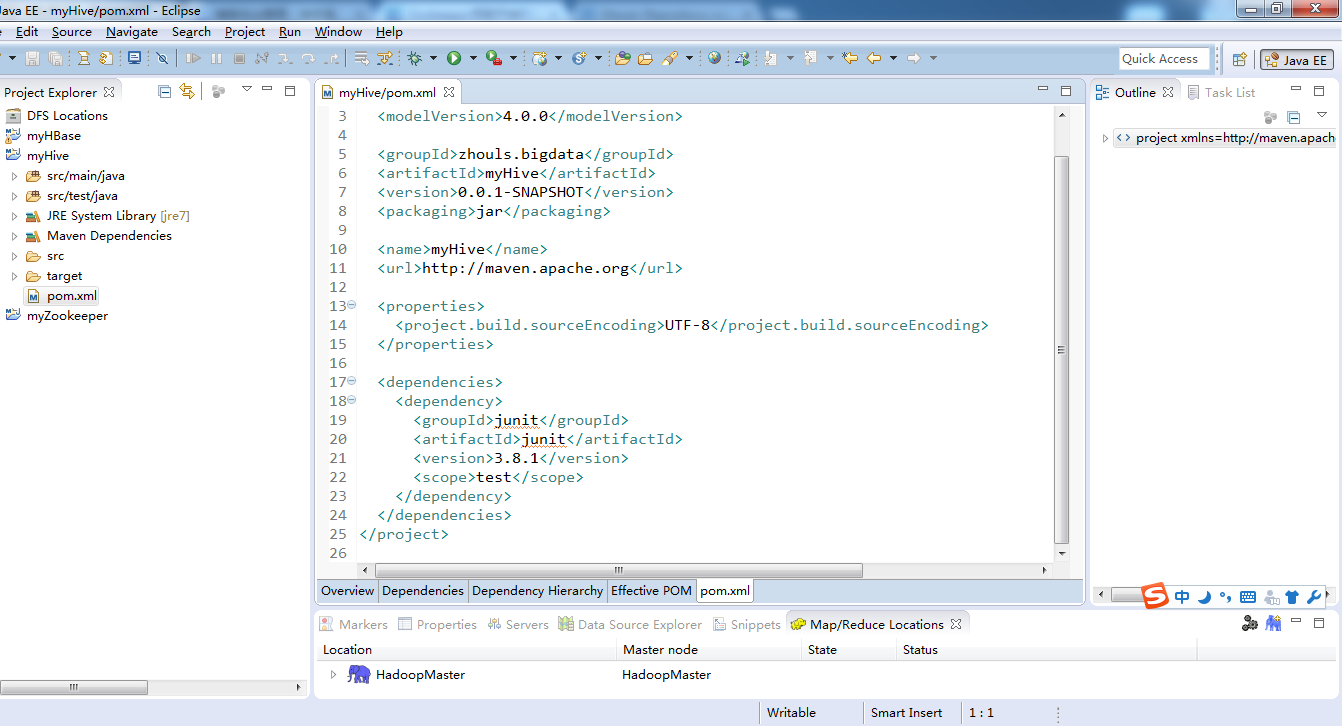
官网Maven的zookeeper配置文件内容:
地址:http://www.mvnrepository.com/search?q=hive
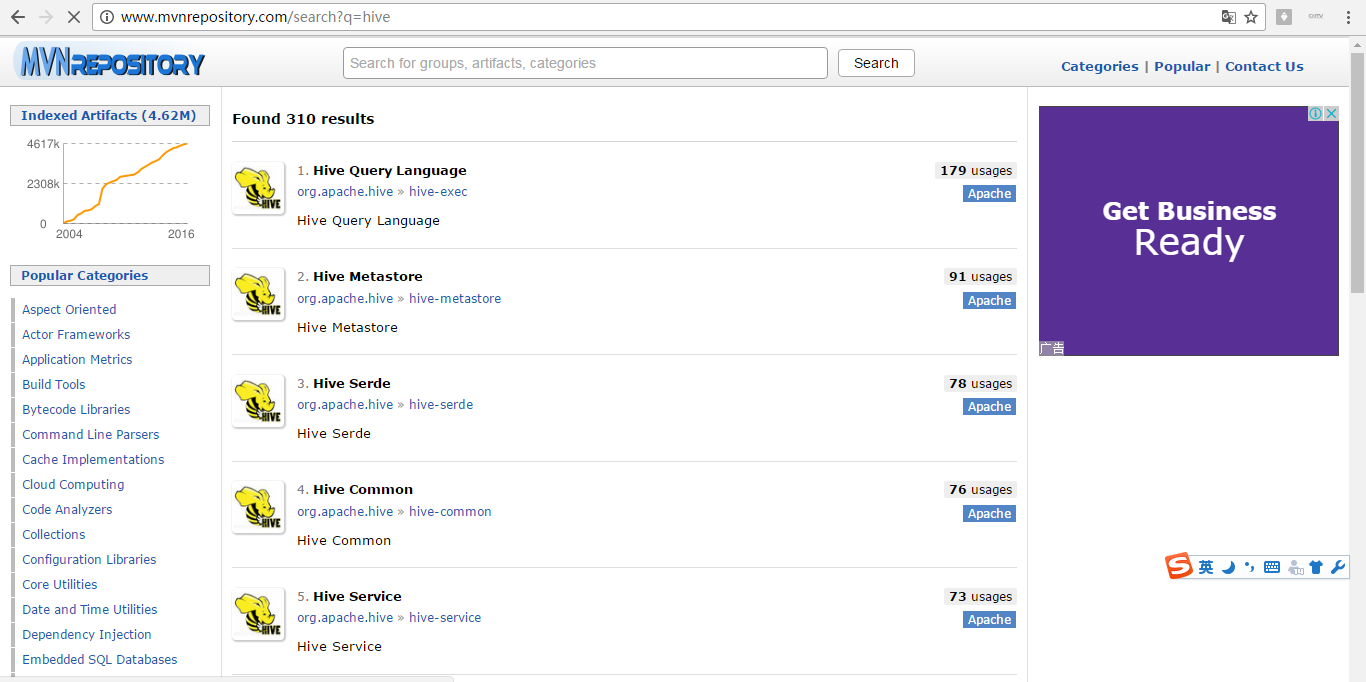

1、
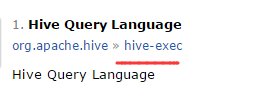
2、

3、

4、

5、

6、

暂时这些吧,以后需要,可以自行再加呢!


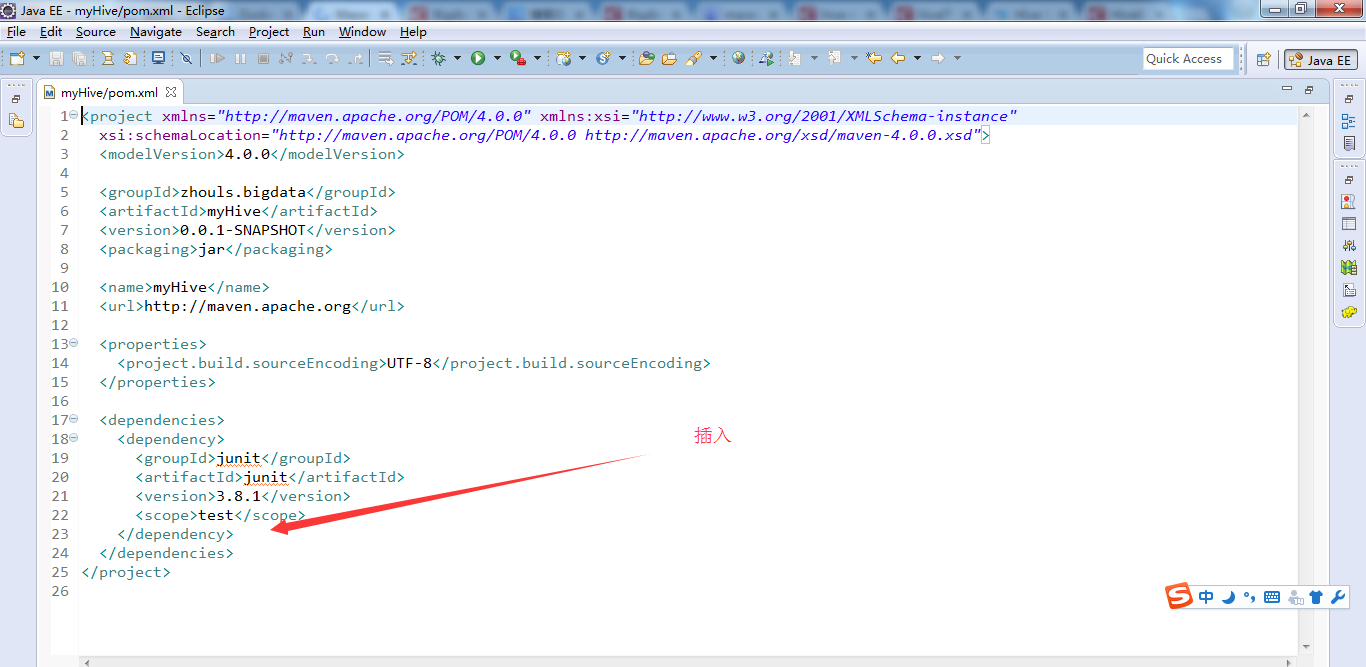
最后的pom.xml配置文件为
<project xmlns="http://maven.apache.org/POM/4.0.0" xmlns:xsi="http://www.w3.org/2001/XMLSchema-instance"
xsi:schemaLocation="http://maven.apache.org/POM/4.0.0 http://maven.apache.org/xsd/maven-4.0.0.xsd">
<modelVersion>4.0.0</modelVersion>
<groupId>zhouls.bigdata</groupId>
<artifactId>myHive</artifactId>
<version>0.0.1-SNAPSHOT</version>
<packaging>jar</packaging>
<name>myHive</name>
<url>http://maven.apache.org</url>
<properties>
<project.build.sourceEncoding>UTF-8</project.build.sourceEncoding>
</properties>
<dependencies>
<dependency>
<groupId>junit</groupId>
<artifactId>junit</artifactId>
<version>3.8.1</version>
<scope>test</scope>
</dependency>
<!-- https://mvnrepository.com/artifact/org.apache.hive/hive-exec -->
<dependency>
<groupId>org.apache.hive</groupId>
<artifactId>hive-exec</artifactId>
<version>1.2.1</version>
</dependency>
<!-- https://mvnrepository.com/artifact/org.apache.hive/hive-metastore -->
<dependency>
<groupId>org.apache.hive</groupId>
<artifactId>hive-metastore</artifactId>
<version>1.2.1</version>
</dependency>
<!-- https://mvnrepository.com/artifact/org.apache.hive/hive-common -->
<dependency>
<groupId>org.apache.hive</groupId>
<artifactId>hive-common</artifactId>
<version>1.2.1</version>
</dependency>
<!-- https://mvnrepository.com/artifact/org.apache.hive/hive-service -->
<dependency>
<groupId>org.apache.hive</groupId>
<artifactId>hive-service</artifactId>
<version>1.2.1</version>
</dependency>
<!-- https://mvnrepository.com/artifact/org.apache.hive/hive-jdbc -->
<dependency>
<groupId>org.apache.hive</groupId>
<artifactId>hive-jdbc</artifactId>
<version>1.2.1</version>
</dependency>
<!-- https://mvnrepository.com/artifact/org.apache.hadoop/hadoop-common -->
<dependency>
<groupId>org.apache.hadoop</groupId>
<artifactId>hadoop-common</artifactId>
<version>2.6.0</version>
</dependency>
<dependency>
<groupId>jdk.tools</groupId>
<artifactId>jdk.tools</artifactId>
<version>1.7</version>
<scope>system</scope>
<systemPath>${JAVA_HOME}/lib/tools.jar</systemPath>
</dependency>
</dependencies>
</project>
当然,这只是初步而已,最简单的,以后可以自行增删。
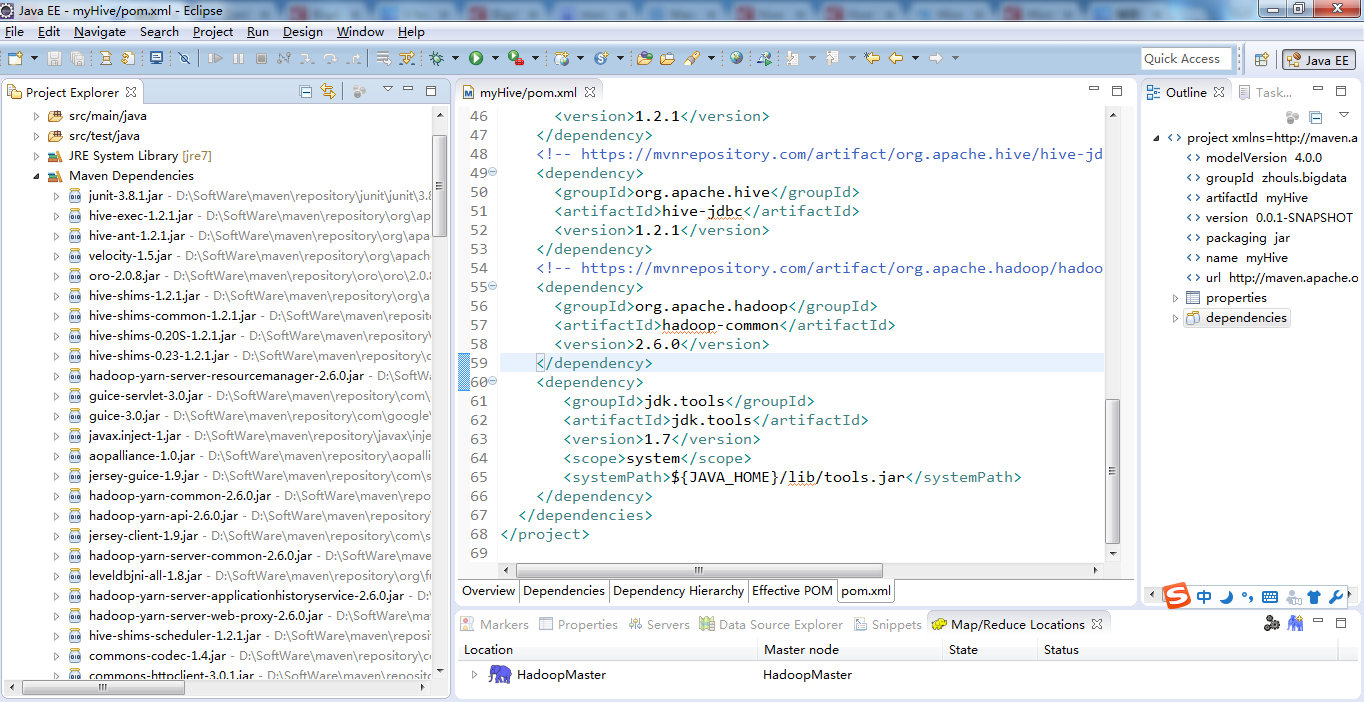
hive里的JDBC编程入门
在使用JDBC链接Hive之前,首先要开启Hive监听用户的连接。即在运行代码前,得
开启Hive服务的方法如下:
hive --service hiveserver2 >/dev/null 2>/dev/null&
步骤七:这里,给大家,通过一组简单的Hive应用程序实例来向大家展示Hive的某些功能。
类名为HiveTestCase.java
1 package zhouls.bigdata.myHive; 2 3 import java.sql.Connection; 4 import java.sql.DriverManager; 5 import java.sql.ResultSet; 6 import java.sql.SQLException; 7 import java.sql.Statement; 8 9 import org.apache.log4j.Logger; 10 11 /** 12 * Handle data through hive on eclipse 13 * @author zhouls 14 * @time 20161112 22:14 15 */ 16 public class HiveTestCase { 17 private static String driverName = "org.apache.hadoop.hive.jdbc.HiveDriver"; 18 private static String url = "jdbc:hive2://djt002:10000/default"; 19 private static String user = ""; 20 private static String password = ""; 21 private static String sql = ""; 22 private static ResultSet res; 23 private static final Logger log = Logger.getLogger(HiveTestCase.class); 24 25 public static void main(String[] args) { 26 try { 27 Class.forName(driverName); // 注册JDBC驱动 28 // Connection conn = DriverManager.getConnection(url, user, password); 29 30 //默认使用端口10000, 使用默认数据库,用户名密码默认 31 Connection conn = DriverManager.getConnection("jdbc:hive2://djt002:10000/default", "", ""); 32 // Connection conn = DriverManager.getConnection("jdbc:hive://HadoopSlave1:10000/default", "", ""); 33 //当然,若是3节点集群,则HadoopMaster或HadoopSlave1或HadoopSlave2都可以呢。前提是每个都安装了Hive,当然只安装一台就足够了。 34 35 // Statement用来执行SQL语句 36 Statement stmt = conn.createStatement(); 37 38 // 创建的表名 39 String tableName = "testHiveDriverTable"; 40 41 /** 第一步:存在就先删除 **/ 42 sql = "drop table " + tableName; 43 stmt.executeQuery(sql); 44 45 /** 第二步:不存在就创建 **/ 46 sql = "create table " + tableName + 47 "(userid int , " + 48 "movieid int," + 49 "rating int," + 50 "city string," + 51 "viewTime string)" + 52 "row format delimited " + 53 "fields terminated by ' ' " + 54 "stored as textfile"; 55 56 // sql = "create table " + tableName + " (key int, value string) row format delimited fields terminated by ' '"; 57 stmt.executeQuery(sql); 58 59 // 执行“show tables”操作 60 sql = "show tables '" + tableName + "'"; 61 System.out.println("Running:" + sql); 62 res = stmt.executeQuery(sql); 63 System.out.println("执行“show tables”运行结果:"); 64 if (res.next()) { 65 System.out.println(res.getString(1)); 66 } 67 68 // 执行“describe table”操作 69 sql = "describe " + tableName; 70 System.out.println("Running:" + sql); 71 res = stmt.executeQuery(sql); 72 System.out.println("执行“describe table”运行结果:"); 73 while (res.next()) { 74 System.out.println(res.getString(1) + " " + res.getString(2)); 75 } 76 77 // 执行“load data into table”操作 78 String filepath = "/usr/local/data/test2_hive.txt"; //因为是load data local inpath,所以是本地路径 79 sql = "load data local inpath '" + filepath + "' into table " + tableName; 80 81 // String filepath = "/hive/data/test2_hive.txt"; //因为是load data inpath,所以是集群路径,即hdfs://djt002/9000/hive/data/下 82 // sql = "load data inpath '" + filepath + "' into table " + tableName; 83 84 System.out.println("Running:" + sql); 85 res = stmt.executeQuery(sql); 86 87 // 执行“select * query”操作 88 sql = "select * from " + tableName; 89 System.out.println("Running:" + sql); 90 res = stmt.executeQuery(sql); 91 System.out.println("执行“select * query”运行结果:"); 92 while (res.next()) { 93 System.out.println(res.getInt(1) + " " + res.getString(2)); 94 } 95 96 // 执行“regular hive query”操作 97 sql = "select count(1) from " + tableName; 98 System.out.println("Running:" + sql); 99 res = stmt.executeQuery(sql); 100 System.out.println("执行“regular hive query”运行结果:"); 101 while (res.next()) { 102 System.out.println(res.getString(1)); 103 104 } 105 106 conn.close(); 107 conn = null; 108 } catch (ClassNotFoundException e) { 109 e.printStackTrace(); 110 log.error(driverName + " not found!", e); 111 System.exit(1); 112 } catch (SQLException e) { 113 e.printStackTrace(); 114 log.error("Connection error!", e); 115 System.exit(1); 116 } 117 118 } 119 }
或者
1 package com.dajangtai.Hive; 2 3 4 5 6 import java.sql.Connection; 7 import java.sql.DriverManager; 8 import java.sql.ResultSet; 9 import java.sql.SQLException; 10 import java.sql.Statement; 11 12 13 public class Demo { 14 private static String driverName = "org.apache.hive.jdbc.HiveDriver";//hive驱动名称 15 private static String url = "jdbc:hive2://djt002:10000/default";//连接hive2服务的连接地址,Hive0.11.0以上版本提供了一个全新的服务:HiveServer2 16 private static String user = "hadoop";//对HDFS有操作权限的用户 17 private static String password = "";//在非安全模式下,指定一个用户运行查询,忽略密码 18 private static String sql = ""; 19 private static ResultSet res; 20 public static void main(String[] args) { 21 try { 22 Class.forName(driverName);//加载HiveServer2驱动程序 23 Connection conn = DriverManager.getConnection(url, user, password);//根据URL连接指定的数据库 24 Statement stmt = conn.createStatement(); 25 26 //创建的表名 27 String tableName = "testHiveDriverTable"; 28 29 /** 第一步:表存在就先删除 **/ 30 sql = "drop table " + tableName; 31 stmt.execute(sql); 32 33 /** 第二步:表不存在就创建 **/ 34 sql = "create table " + tableName + " (key int, value string) row format delimited fields terminated by ' ' STORED AS TEXTFILE"; 35 stmt.execute(sql); 36 37 // 执行“show tables”操作 38 sql = "show tables '" + tableName + "'"; 39 res = stmt.executeQuery(sql); 40 if (res.next()) { 41 System.out.println(res.getString(1)); 42 } 43 44 // 执行“describe table”操作 45 sql = "describe " + tableName; 46 res = stmt.executeQuery(sql); 47 while (res.next()) { 48 System.out.println(res.getString(1) + " " + res.getString(2)); 49 } 50 51 // 执行“load data into table”操作 52 String filepath = "/usr/local/data/djt.txt";//hive服务所在节点的本地文件路径 53 sql = "load data local inpath '" + filepath + "' into table " + tableName; 54 stmt.execute(sql); 55 56 // 执行“select * query”操作 57 sql = "select * from " + tableName; 58 res = stmt.executeQuery(sql); 59 while (res.next()) { 60 System.out.println(res.getInt(1) + " " + res.getString(2)); 61 } 62 63 // 执行“regular hive query”操作,此查询会转换为MapReduce程序来处理 64 sql = "select count(*) from " + tableName; 65 res = stmt.executeQuery(sql); 66 while (res.next()) { 67 System.out.println(res.getString(1)); 68 } 69 conn.close(); 70 conn = null; 71 } catch (ClassNotFoundException e) { 72 e.printStackTrace(); 73 System.exit(1); 74 } catch (SQLException e) { 75 e.printStackTrace(); 76 System.exit(1); 77 } 78 } 79 }
若是MyEclipse里,需要注意一下
MyEclipse *的安装步骤和破解(32位和64位皆适用)
